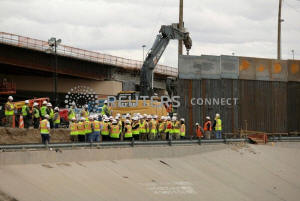|
Explainer: Trump risks legal fight with
emergency threat on wall
 Send a link to a friend
Send a link to a friend
 [February 15, 2019]
By Ginger Gibson and Jan Wolfe [February 15, 2019]
By Ginger Gibson and Jan Wolfe
WASHINGTON (Reuters) - President Donald
Trump will almost certainly face legal challenges over his decision to
declare a national emergency to get additional funding for a U.S.-Mexico
border wall, circumventing the power of Congress to set spending policy.
Legal scholars say it is unclear how such a step would play out, but
they agree a court test would likely focus on whether an emergency
actually exists on the southern border and on the limits of presidential
power over taxpayer funds.
Trump is unhappy with a bipartisan border security bill that is going
through Congress to avert another government shutdown, because it
contains only a fraction of the funds he demanded for his promised
border wall. The White House said Trump would sign the bill but declare
a national emergency to try to obtain funds for the wall.
That will likely trigger a long legal fight possibly stretching into
Trump’s 2020 re-election bid, and embolden critics who already accuse
him of authoritarian tendencies and unpredictable swerves in
policy-making.
Congressional Democrats are already vowing legal challenges.
They have balked at giving Trump money for what they say is a wasteful
and unnecessary wall.

Trump made his promise to build a wall and have Mexico pay for it a
centerpiece of his 2016 presidential campaign. The Mexican government
has refused to pay.
PRESIDENTIAL DISCRETION
Under the Constitution, decisions about spending taxpayer funds and
creating policy are typically made by Congress.
But a 1976 law allows the president to bypass Congress and redirect
funds in the event of a national emergency. The National Emergencies Act
does not define “emergency,” giving the president broad discretion to
declare one, legal experts said.
The law empowers Congress to override an emergency declaration, but that
requires action by both chambers, which would be hard to get since the
Senate is run by Trump’s fellow Republicans and the House of
Representatives by Democrats.
The United States currently has about 30 national emergency
proclamations in effect, including ones related to the Iran hostage
crisis of 1979 and the swine flu pandemic in 2009.
Congress has made a wide range of special powers available to a
president who declares a national emergency.
One law allows the president to redirect U.S. Department of Defense
construction funds that have not yet been allocated.
Another enables the U.S. Army to halt civil projects and instead apply
the funds and personnel to projects “essential to the national defense.”
[to top of second column]
|

Workers and U.S border patrol officers stand next to an excavator
working in a section of the new wall between El Paso, Texas, in the
United States and Ciudad Juarez as seen from the Mexican side of the
border in Ciudad Juarez, Mexico, February 5, 2019. REUTERS/Jose Luis
Gonzalez

LITTLE PRECEDENT
There are few court cases on the scope of the president’s emergency
powers, and legal experts are split.
Robert Chesney, a professor of national security law at the
University of Texas, said a legal challenge on those grounds might
succeed but that the courts typically showed deference to the
president on national security matters.
Elizabeth Goitein, a lawyer at the Brennan Center for Justice, said
there were strong arguments that border wall construction is
impermissible under various statutes granting the president
emergency powers.
While the U.S. Supreme Court has denied legal standing to individual
lawmakers from the House of Representatives challenging White House
actions, the entire House may have more solid legal ground to bring
a lawsuit.
In 2015, the federal appeals court in Washington said the House as
an institution had standing to challenge a means chosen by the Obama
administration to fund part of the Affordable Care Act, where
Congress had not appropriated the money.
Individuals or businesses with contracts canceled because of a
redirection of military funds could also challenge Trump in court,
as could private landowners whose property might be seized, Chesney
said.
A practical issue for Trump, even if he could credibly argue an
emergency exists, is that he would need to get his wall money out of
whatever funds are left over from a pool of about $10.4 billion in
military construction projects during the current fiscal year, which
ends on Sept. 30.

The U.S. military has not disclosed how much funding might be left
over in its military construction budget. It was unclear whether any
cash still available would be enough to make significant headway in
building the border wall.
(Reporting by Ginger Gibson and Jan Wolfe; Editing by Peter Cooney)
[© 2019 Thomson Reuters. All rights
reserved.]
Copyright 2019 Reuters. All rights reserved. This material may not be published,
broadcast, rewritten or redistributed.
Thompson Reuters is solely responsible for this content. |